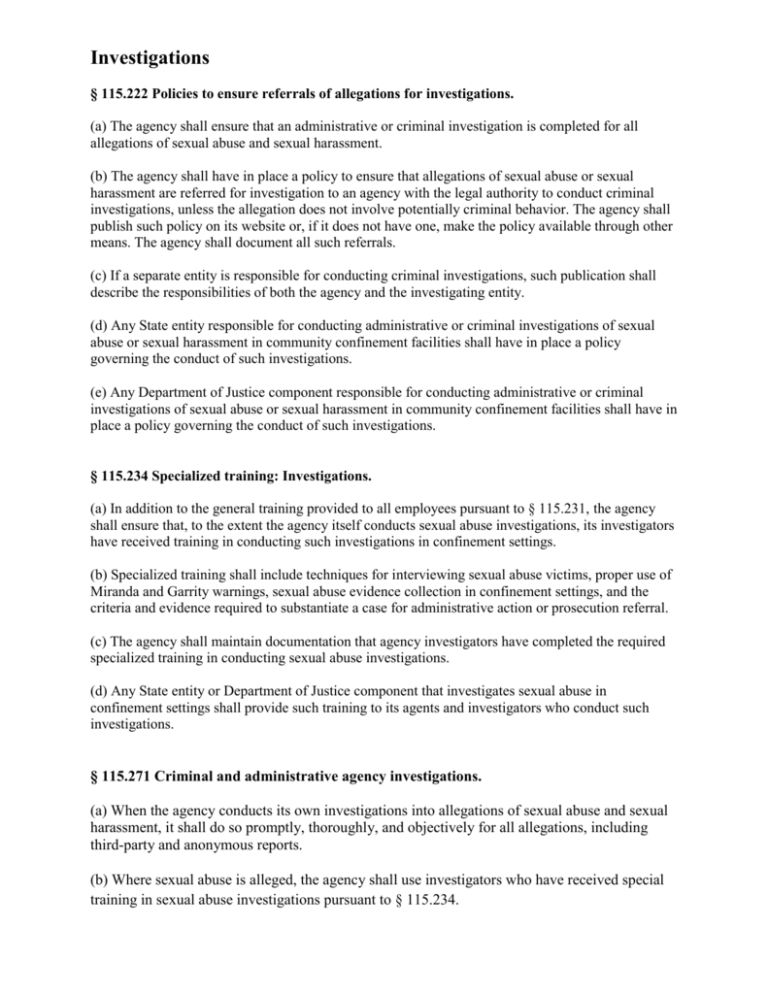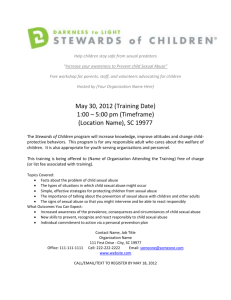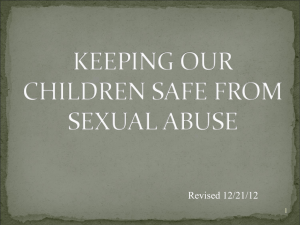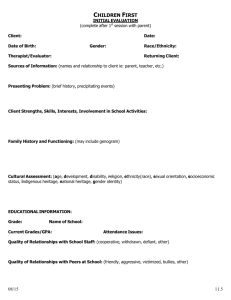
Investigations
§ 115.222 Policies to ensure referrals of allegations for investigations.
(a) The agency shall ensure that an administrative or criminal investigation is completed for all
allegations of sexual abuse and sexual harassment.
(b) The agency shall have in place a policy to ensure that allegations of sexual abuse or sexual
harassment are referred for investigation to an agency with the legal authority to conduct criminal
investigations, unless the allegation does not involve potentially criminal behavior. The agency shall
publish such policy on its website or, if it does not have one, make the policy available through other
means. The agency shall document all such referrals.
(c) If a separate entity is responsible for conducting criminal investigations, such publication shall
describe the responsibilities of both the agency and the investigating entity.
(d) Any State entity responsible for conducting administrative or criminal investigations of sexual
abuse or sexual harassment in community confinement facilities shall have in place a policy
governing the conduct of such investigations.
(e) Any Department of Justice component responsible for conducting administrative or criminal
investigations of sexual abuse or sexual harassment in community confinement facilities shall have in
place a policy governing the conduct of such investigations.
§ 115.234 Specialized training: Investigations.
(a) In addition to the general training provided to all employees pursuant to § 115.231, the agency
shall ensure that, to the extent the agency itself conducts sexual abuse investigations, its investigators
have received training in conducting such investigations in confinement settings.
(b) Specialized training shall include techniques for interviewing sexual abuse victims, proper use of
Miranda and Garrity warnings, sexual abuse evidence collection in confinement settings, and the
criteria and evidence required to substantiate a case for administrative action or prosecution referral.
(c) The agency shall maintain documentation that agency investigators have completed the required
specialized training in conducting sexual abuse investigations.
(d) Any State entity or Department of Justice component that investigates sexual abuse in
confinement settings shall provide such training to its agents and investigators who conduct such
investigations.
§ 115.271 Criminal and administrative agency investigations.
(a) When the agency conducts its own investigations into allegations of sexual abuse and sexual
harassment, it shall do so promptly, thoroughly, and objectively for all allegations, including
third-party and anonymous reports.
(b) Where sexual abuse is alleged, the agency shall use investigators who have received special
training in sexual abuse investigations pursuant to § 115.234.
(c) Investigators shall gather and preserve direct and circumstantial evidence, including any
available physical and DNA evidence and any available electronic monitoring data; shall
interview alleged victims, suspected perpetrators, and witnesses; and shall review prior
complaints and reports of sexual abuse involving the suspected perpetrator.
(d) When the quality of evidence appears to support criminal prosecution, the agency shall
conduct compelled interviews only after consulting with prosecutors as to whether compelled
interviews may be an obstacle for subsequent criminal prosecution.
(e) The credibility of an alleged victim, suspect, or witness shall be assessed on an individual
basis and shall not be determined by the person’s status as resident or staff. No agency shall
require a resident who alleges sexual abuse to submit to a polygraph examination or other truthtelling device as a condition for proceeding with the investigation of such an allegation.
(f) Administrative investigations:
(1) Shall include an effort to determine whether staff actions or failures to act contributed to the
abuse; and
(2) Shall be documented in written reports that include a description of the physical and
testimonial evidence, the reasoning behind credibility assessments, and investigative facts and
findings.
(g) Criminal investigations shall be documented in a written report that contains a thorough
description of physical, testimonial, and documentary evidence and attaches copies of all
documentary evidence where feasible.
(h) Substantiated allegations of conduct that appears to be criminal shall be referred for
prosecution.
(i) The agency shall retain all written reports referenced in paragraphs (f) and (g) of this section
for as long as the alleged abuser is incarcerated or employed by the agency, plus five years.
(j) The departure of the alleged abuser or victim from the employment or control of the facility
or agency shall not provide a basis for terminating an investigation.
(k) Any State entity or Department of Justice component that conducts such investigations shall
do so pursuant to the above requirements.
(l) When outside agencies investigate sexual abuse, the facility shall cooperate with outside
investigators and shall endeavor to remain informed about the progress of the investigation.
§ 115.272 Evidentiary standard for administrative investigations.
The agency shall impose no standard higher than a preponderance of the evidence in determining
whether allegations of sexual abuse or sexual harassment are substantiated.
§ 115.273 Reporting to residents.
(a) Following an investigation into a resident’s allegation of sexual abuse suffered in an agency
facility, the agency shall inform the resident as to whether the allegation has been determined to
be substantiated, unsubstantiated, or unfounded.
(b) If the agency did not conduct the investigation, it shall request the relevant information from
the investigative agency in order to inform the resident.
(c) Following a resident’s allegation that a staff member has committed sexual abuse against the
resident, the agency shall subsequently inform the resident (unless the agency has determined
that the allegation is unfounded) whenever:
(1) The staff member is no longer posted within the resident’s unit;
(2) The staff member is no longer employed at the facility;
(3) The agency learns that the staff member has been indicted on a charge related to sexual
abuse within the facility; or
(4) The agency learns that the staff member has been convicted on a charge related to sexual
abuse within the facility.
(d) Following a resident’s allegation that he or she has been sexually abused by another resident,
the agency shall subsequently inform the alleged victim whenever:
(1) The agency learns that the alleged abuser has been indicted on a charge related to sexual
abuse within the facility; or
(2) The agency learns that the alleged abuser has been convicted on a charge related to sexual
abuse within the facility.
(e) All such notifications or attempted notifications shall be documented.
(f) An agency’s obligation to report under this standard shall terminate if the resident is released
from the agency’s custody.
TRAINING:
Follow this link to the PREA Resource Center Curricula page and select the link for Specialized
Training: Investigating Sexual Abuse in Confinement Settings. This training should meet the
PREA audit requirements for agency staff to do preliminary and administrative investigations.








